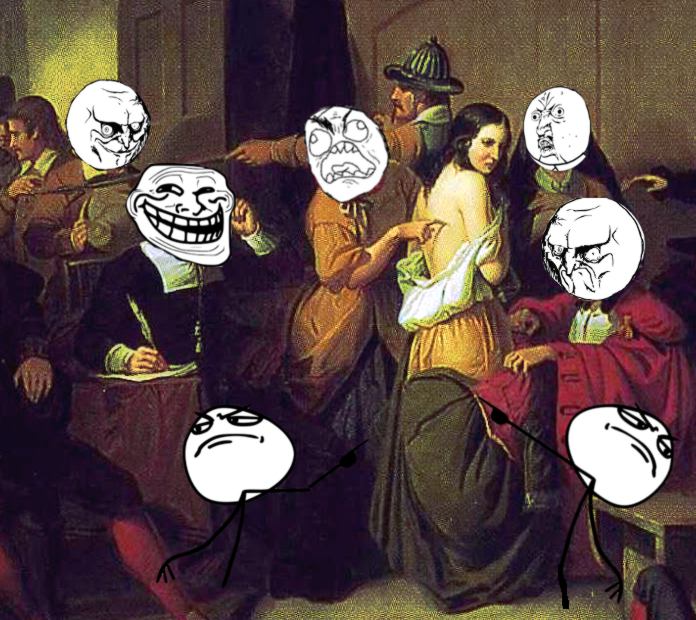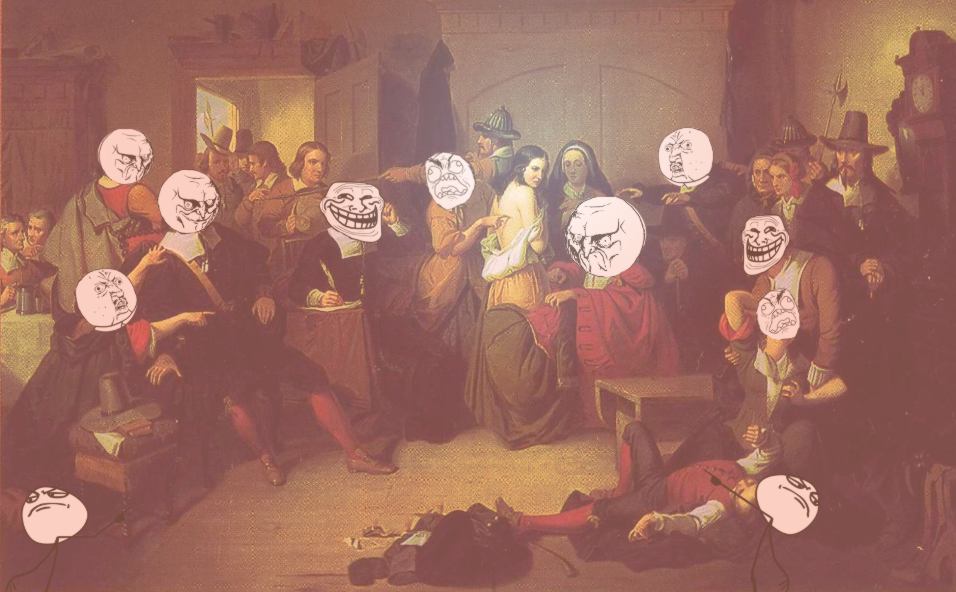By Margaret Matson
“What do you regard as most humane? To spare someone shame.”
—Nietzsche
I imagine all people have felt shame at one point or another in their lives. Shame is a prison of the mind and heart that can cage us regardless of space or time. It is easy to feel powerless, alone and inherently flawed given the insurmountable challenges we face. Those of us who struggle to negate the conscripted fate that capitalism and social strata thrust upon us face a critical question. How do we spare ourselves and one another shame?
Moral panic is a sociological phenomena in which individuals or groups are persecuted within a larger social group. These panics are precipitated by the presence of several key ingredients: social order, fear of that social order being threatened, and the existence of taboos—unnameable things which members of the group cannot address without experiencing fear.
A moral panic begins with the accusation of a “folk devil” made by a “moral entrepreneur.” This folk devil is accused of causing ill within the community by violating the social order. The entrepreneur, often a priest, politician or activist, is quickly and readily validated because of the preexisting level of anxiety amongst the community. The problem becomes more convoluted because it centers upon a topic which is taboo to discuss, making it impossible for people to admit or even recognize their intentions and motivations. Soon, more and more people are accusing one another of deviant behavior and rushing to increasingly drastic measures to rid themselves of anybody that is perceived as a threat to the community, despite the fact that the folk devils were members of the established community to begin with. Moral panic often antecedes genocide.
A small-scale example, well known to many here in the US, is the Salem Witch Trials. Even before the witch trials erupted, the neighboring communities to the Salem area considered them “quarrelsome.” The moral entrepreneurs in this case were several young women who began having “fits,” along with the local magistrate, who accused three outliers within the community of witchcraft.
Soon, many were accusing many others of witchcraft. Almost all of those convicted were women. Upon examining the links within the Salem colony, it becomes obvious that many of these accusations had less to do with any real threat of the Devil and more to do with land and inheritance disputes. Needless to say, none of the trials record any frank discussion of sexuality or property.

There was likely real fear that gripped these people, which no doubt escalated as the panic gained momentum. A mysterious headache or sour milk could result in torture and public execution. I find myself giving those tightlipped Protestants the benefit of the doubt. They probably did not consciously seek to murder their female neighbors over land—they were probably truly terrified of the Devil. Ultimately, the young women having these “fits” surely were not aided by the public hangings.
Admitting that anarchist and radical groups have a “social order” may be uncomfortable, and the word “community” can be a touchy subject in and of itself. However, social order forms naturally and inevitably wherever and whenever people participate in groups, no matter how disordered or anti-order the group may be. One can also refer to this organic process as culture. When one is part of a social group, one remembers familiar faces, shares common references and might use cues like dress or speech to identify one another. Most members of radical circles have a sense of what’s appropriate and inappropriate to say or do in radical spaces and circles.
Why do we hold anarchists to higher standards than everybody else?There is no such thing as a perfect anarchist. However, many seem to hold an idealized image of perfection aloft—constantly comparing themselves and others to it. The perfect anarchist is always an ally to the oppressed, yet an enemy of the oppressors. The perfect anarchist always respects “safe space” and knows how to conduct him or herself in almost any social situation. Perfect anarchists are original, individualistic and unapologetic, in part because they never have to apologize. Perhaps within this caricature of perfection, one may see some anarchist taboos inverted: power, oppression and hierarchy. What is “right” for an anarchist? What is “wrong?” How do anarchists hold power? How can an individual be part of a community? How can a community embrace individuality? Why do we hold anarchists to higher standards than everybody else?
Many anarchists feel a certain amount of justified fear of the things which threaten their lives and lifestyles. It is natural and logical to have some anxiety regarding homelessness, police violence, surveillance and imprisonment. Not only do anarchists experience threats from the outside—we experience them from within. Informants, COINTELPRO, crypto-fascists and fools with no security culture are all threats which can and do harm us. However, this general sense of unease and distrust can lead to outcomes that threaten anarchist projects as much as any state oppression.
I feel that I have seen a growing tendency within radical circles towards “callout culture.” A callout is a disempowered party publicly calling out another party on their behavior. In theory, it is meant to restore power to the disempowered and create a climate in which accountability can happen. Callouts can result in people re-examining their attitudes and behaviors in ways which inspire a great deal of personal growth, especially when done in a respectful, sincere way. In practice, this is not always the case.
Sometimes, when somebody asks for accountability, they are really demanding revenge.The crux of a callout relies on credibility and authority – how one gains and holds social power. Callouts generally favor whoever has more social currency within their circle. Rather than aiding the disempowered, callouts can give figures of authority more power, more credibility and more attention. Often, victims of oppressive or violent behavior are ignored, dismissed or viewed with distrust when they call out the party who has wronged them. Sometimes, victims of violence are used by others who call out on their behalf, acting without their permission or knowledge. Perhaps just as often, people are falsely accused of wrongdoing by a charismatic individual seeking power over a situation. The folk devil is effectively stripped of all credibility; they are suddenly the subject of distrust, debate and controversy. Sometimes, when somebody asks for accountability, they are really demanding revenge.
Instead of talking directly about the underlying power dynamics in these situations, it is easy to fall in line with whoever is thought to be more credible or whoever holds more authority. There are times when the loudest voices in the room are heard while others are silenced by shouting. Other times it is the quietest voices that carry the most weight. Whispered stories circulate and morph in an endless game of telephone. Meanwhile the storytellers impress upon their audience to not reveal their source because they fear retaliation.
Often, simply asking questions about what actually happened or searching for clarity is viewed as an oppressive, offensive act in and of itself. However, how can one seek justice without even understanding the situation, its context and the desired outcomes of all directly affected? How can one seek accountability without being able to be accountable for one’s own words? How can one redistribute power equitably without talking directly about power itself, both individual and systemic?
Definitive characteristics of moral panic: concern, hostility, volatility, consensus and disproportionality of reaction. When somebody is called out for oppressive, offensive or violent behavior, people often naturally react with concern and hostility. When there is a general consensus within a group that the called out is guilty until proven innocent, the course is set for actions and outcomes that often are unpredictable and harsh.
People overreact. They start flame wars, get into fights and try to ruin one another’s lives—the whole time forgetting that the people they are persecuting with so much self-righteousness are their friends, lovers, housemates, fellow activists and chosen-family. They feel ashamed and shame one another. And the persecution and pain usually doesn’t end there. Witch hunts hurt everybody involved. Everybody risks getting burnt at the stake.
The terrible irony is that calling somebody out can often be a violent, oppressive act in and of itself, especially when it results in being blacklisted, forcibly evicted and/or publicly shamed. Often people are called out for being “oppressors,” “abusers” or “predators,” and these vague terms can follow a person for years, across borders, regardless of their behavior or the original context. It is my heartfelt conviction that we must create our own vibrant forms of justice, sometimes calling one another out and establishing hard boundaries; however, one cannot use callouts to simply punish people, grasp power and recreate the worst aspects of state “justice.”
Callouts are rooted in critical social theory, which seeks a dialectic between sociology and free will. Sadly, critical awareness naturally suffers when one is experiencing fear and anxiety. Some questions I have asked myself in these situations and found helpful include: what results do I want? What results do others want? Are there material resources involved? How can I help the people that are affected (both accused and accuser)? Am I involved? If I’m not directly involved, why do I want to be? What are my motivations? What level of commitment to my involvement can I really make? How can I take care of my needs, regardless of outcome?
When a crisis erupts within a group, be it large or small, it can take a while to establish enough clarity and calm to even have a dialogue. Often, these situations are complex and take such a high level of commitment to work through, nobody finds healing. I have found solace in at least starting this dialogue internally. When a group experiences a sense of moral panic, all one can do as an individual is seek moral clarity for themselves. Personally, I do not want to pronounce others as either guilty or innocent, assured that I am often both. I prefer to judge myself, and know that my individual morality challenges me to act with sensitivity, caution, courage, integrity and commitment in all situations. I know that these values do not apply to anybody but me. I am not perfect and I never will be. And I know that a world beyond guilt and innocence is possible.



